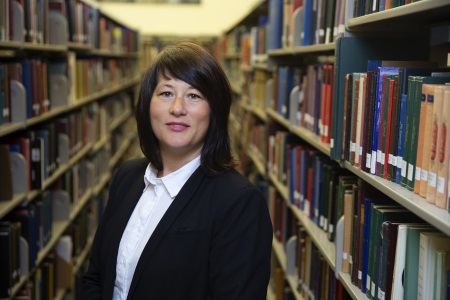
Career Spotlight: What I do as a Grants and Awards Librarian
February 18, 2019
Christine Walde
Grants and Awards Librarian at the University of Victoria Libraries
First of all, tell us a bit about your current work and how long you’ve been at it.
I am the Grants and Awards Librarian at the University of Victoria Libraries. In this role, which I have held since 2012, I support and enhance the research activities and community engagement priorities of UVic Libraries, specifically in the areas of grants funding and awards, including special projects related to community engagement. I am also the General Editor of UVic Libraries’ publication series, which is devoted to showcasing the library’s archives and special collections.
What drove you to choose your career path and how did you go about getting your job? What kind of education and experience did you need?
Prior to attending FIMS at Western, I had a varied career in arts administration and working in the private and public sector. I chose to go to library school because I was interested in lifelong learning and community engagement, and wanted to expand my career to include opportunities within libraries and archives. When I was hired at UVic in 2012, my position was created to fit my unique competencies and skill sets in these areas.
What kinds of things do you do beyond what most people see? What do you actually spend the majority of your time doing?
In my position, I spend a lot of time doing administrative work. As a Grants and Awards Librarian, there is a lot of paperwork, not to mention completing the grants and awards applications themselves, along with meeting deadlines and reporting structures.
What misconceptions do people often have about your job?
One of the misconceptions I sometimes encounter is that my job doesn’t have to be a librarian position. However, I think being a librarian is critical to my position, since I understand things about libraries and archives other grants crafters often do not –especially when it comes to things like open access, research data management, and the importance of digitization, as a few examples.
What are your average work hours? Typical 9-5 thing or not?
Most days I eat my lunch at my desk, and usually work between 40-50 hours a week, give or take.
What personal tips and shortcuts made your job easier?
I try to infuse as much creativity into my job as possible – whether it’s in thinking about long-term solutions or in my everyday approaches. While it might not always make things “easier”, it nourishes my practice as a librarian in a way that sustains me through the burden of the administrative work.
What do you do differently from your peers in the same profession?
Since I don’t have an assigned subject area or do collections work, some peers may see my position as operating outside of a liaison model. However, I still function very much within the traditional liaison structure, offering research support and expertise to faculty, administration, and students while engaging with community, government and non-profit organizations.
What’s the worst part of the job and how do you deal with it?
Email. I deal with it the way most people I know deal with email: filing, prioritization and flagging. Lately I’ve been finding it’s often easier – and much more enjoyable — to just pick up the phone or speak to someone in person.
What’s the most enjoyable part of the job?
As the General Editor for UVic Libraries’ publication series that highlights our archives and special collections, I get to work with a very talented bunch of colleagues, including fellow librarians, archivists, artists, designers, writers and printers to bring these books into life. As an artist myself — whose work combines library and archival research with interests in experimental prose, poetry, visual poetry, performance, and the visual arts — I immensely enjoy bringing these creations into the world.
Is there a way to “move up” in your field?
Yes, I suppose I could move into a higher level of library administration or within the university, but I like where I am and the people I currently work with.
What advice would you give to those aspiring to join your profession?
Librarianship feels as vital to me today as it did when I first started library school in 2012. To those aspiring to join the profession, the most important advice I would give would be to inject your creativity and unique life experiences into your practice as a librarian with passion and purpose.
Add a new comment